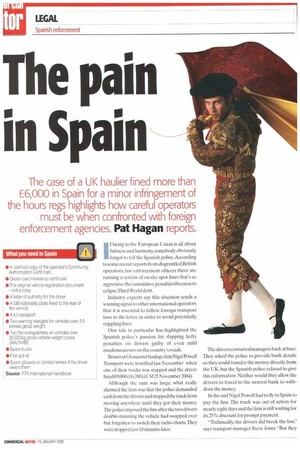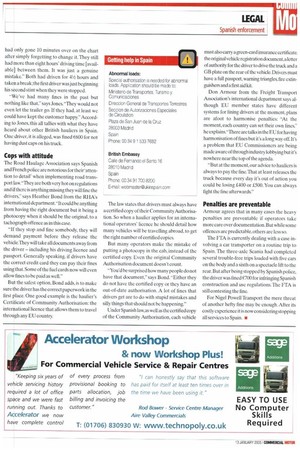The pain in Spain
Page 30

Page 31

If you've noticed an error in this article please click here to report it so we can fix it.
The case of a UK haulier fined more than £6,000 in Spain for a minor infringement of the hours regs highlights how careful operators must be when confronted with foreign enforcement agencies. Pat Hagan reports.
If being in the European Union is all about fairness and harmony,somebody obviously forgot to tell the Spanish police. According to some recent reports from disgruntled British operators, law enforcement officers there are running a system of on-the-spot fines that's so aggressive the cumulative penalties threaten to eclipse Third World debt.
Industry experts say this situation sends a warning signal to other international operators that it is essential to follow foreign transport laws to the letter, in order to avoid potentially crippling fines.
One tale in particular has highlighted the Spanish police's passion for slapping hefty penalties on drivers guilty of even mild misdemeanours on the country's roads.
Bosses at Gloucester haulage lirmNigel Powell Transport were horrified last November when one of their trucks was stopped and the driver fined €9,000 (£6,200) (CM 25 November 2004).
Although the sum was large, what really alarmed the firm was that the police demanded cash from the drivers and stopped the truck from moving anywhere until they got their money. The police imposed the fine after the two drivers double-manning the vehicle had swapped over but forgotten to switch their tacho charts. They were stopped just 10 minutes later. The drivers contacted managers back at base. They asked the police to provide bank details so they could transfer the money directly from the UK, but the Spanish police refused to give this information. Neither would they allow the drivers to travel to the nearest bank to withdraw the money.
In the end Nigel Powell had to fly to Spain to pay the fine. The truck was out of action for nearly eight days and the firm is still waiting for its 25% discount for prompt payment.
"Technically, the drivers did break the law," says transport manager Steve Jones. "But they had only gone 10 minutes over on the chart after simply forgetting to change it. They still had more than eight hours' driving time [available] between them. It was just a genuine mistake." Both had driven for 41/2 hours and taken a break:the first driver was just beginning his second stint when they were stopped.
"We've had many fines in the past but nothing like that,says Jones. "They would not even let the trailer go. If they had, at least we could have kept the customer happy." According to Jones, this all tallies with what they have heard about other British hauliers in Spain. One driver, it is alleged, was fined €600 for not having dust caps on his truck.
Cops with attitude
The Road Haulage Association says Spanish and French police are notorious for their'attention to detail' when implementing road transport law. "They are both very hot on regulations and if there is anything missing they will fine the drivers," says Heather Bond from the RHA's international department."It could be anything from having the right document but it being a photocopy when it should be the original, to a tachograph offence as in this case.
"If they stop and fine somebody, they will demand payment before they release the vehicle.They will take all documents away from the driver — including his driving licence and passport. Generally speaking. if drivers have the correct credit card they can pay their fines using that. Some of the fuel cards now will even allow fines to be paid as well."
But the safest option, Bond adds, is to make sure the driver has the correct paperwork in the first place. One good example is the haulier's Certificate of Community Authorisation: the international licence that allows them to travel through any EU country. The law states that drivers must always have a certified copy of their Community Authorisation. So when a haulier applies for an international operators' licence he should detail how many vehicles will be travelling abroad, to get the right number of certified copies.
But many operators make the mistake of putting a photocopy in the cab, instead of the certified copy. Even the original Community Authorisation document doesn't count.
"You'd be surprised how many people do not have that document," says Bond. "Either they do not have the certified copy or they have an out-of-date authorisation. A lot of fines that drivers get are to do with stupid mistakes and silly things that should not be happening."
Under Spanish law, as well as the certified copy of the Community Authorisation, each vehicle must also carry a green-card insurance certificate. the original vehicle registration document,a letter of authority for the driver to drive the truck and a GB plate on the rear of the vehicle. Drivers must have a full passport, warning triangles, fire extinguishers and a first aid kit.
Don Armour from the Freight Transport Association's international department says although EU member states have different systems for lining drivers at the moment, plans are afoot to harmonise penalties: "At the moment, each country can set their own fines," he explains."There are talks in the EU for having harmonisation of fines but it's a long way off. It's a problem that EU Commissioners are being made aware of through industry lobbying but it's nowhere near the top of the agenda.
"But at the moment, our advice to hauliers is always to pay the fine. That at least releases the truck because every day it's out of action you could be losing £400 or £500. You can always fight the fine afterwards."
Penalties are preventable
Armour agrees that in many cases the heavy penalties are preventable if operators take more care over documentation. But while some offences are predictable. others are less so.
The FTA is currently dealing with a case involving a car transporter on a routine trip to Spain. The three-axle Scani a had completed several trouble-free trips loaded with five cars on the body and a sixth on a spectacle lift to the rear. But after being stopped by Spanish police, the driver was fined €700 for infringing Spanish construction and use regulations. The FTA is still contesting the tine.
For Nigel Powell Transport the mere threat of another hefty fine may be enough. After its costly experience it is now considering stopping all services to Spain. •






















































































































































































